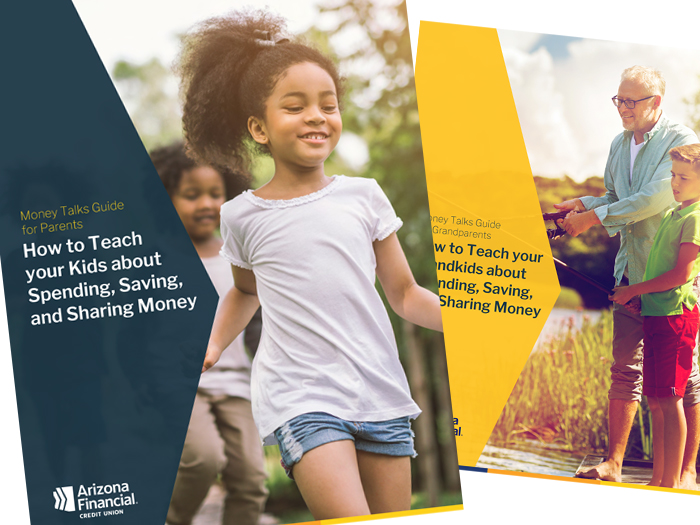1 $25 bonus deposit requires a minimum opening deposit of $25. Must be a brand new member with no existing primary account relationships with Arizona Financial. Current joint account owners may qualify by opening a new account as the primary member/owner. Former members may qualify as a new member if previous accounts were closed 12 or more months prior to new open date. Terms and conditions subject to change without notice. Offer expires January 31, 2026.

Dollars & Sense: How to teach your kids about spending, saving & sharing money
Experts recommend starting with the basics when your child is a preschooler and continuing to introduce more complex concepts as they progress through grade school, their teen years and young adulthood.
No matter how old your kids are, put them on the path to good money habits. Our free Money Talks Guide for Parents and Grandparents outlines conversation topics and practical ideas for teaching children about money from ages 3 through 20.
Smart Guide: Money Talks Guide for Parents & Grandparents

Money Talks Guide
Inside the Guide
Learn how to teach your kids about saving, spending and sharing money.
- Get financial topics categorized by age range
- Includes action ideas for practical ways to talk with your kids about money.

Give the Gift of Savings today!
We're with you for every money milestone with accounts designed to grow as your kids do. Schedule an appointment to visit any of our branch locations to get started.
Our Youth Savings Account is the perfect way to start teaching your child (ages 12 and under) about money. Easily transfer funds between accounts and monitor balances with mobile banking and online banking. Is your child older? Check out our Teen Savings Account (ages 13-17).
No deposit is required to open a Youth Savings Account! Show your child how to start at $0 and save for future success.
With no monthly service fee, all of your child's money stays directly in their account.
Turn extra coins into additional savings with free Coinstar transactions at most branch locations.
Open your child's account with a $25 deposit and we'll match that amount dollar for dollar.1
Kids Savings Account Rate (ages 12 & under)
Our competitive Kids Savings Account rate is the perfect way to teach your children about compound interest.
Earn APY*
Rate
Earn APY*
Rate
*APY – Annual Percentage Yield. Rates are variable and may change after account is opened. Fees may reduce earnings. No minimum opening deposit is required.
*APY – Annual Percentage Yield. Rates are variable and may change after account is opened. Fees may reduce earnings. No minimum opening deposit is required.
Open Your Youth Savings Account:
What You Need to Open a Youth Account

-
Must Have Joint Owner Present
A parent/guardian/adult relative (18 years of age or older) must be present at the account opening.
-
Social Security or Tax ID card
You must bring a Social Security or tax ID number for both the child and joint owner.
-
Identification
You must bring your school ID or government-issued ID.

The Best Teen Banking Account for Saving!
Arizona Financial requires $0 to open our Teen Savings Account. With no monthly service fee, this account is affordable and a great way to start your teen on the path to saving.
Applicants will need to show a current ID (school ID, driver's license, state ID, etc.) and Social Security or tax ID number. If you wish to add a joint owner, they must be 18 or older.
Turn extra coins into additional savings with free Coinstar transactions at most branch locations.
Open your teen's account with a $25 deposit and we'll match that amount dollar for dollar.1
Teen Savings Account Rates (ages 13-17)
Our Teen Savings Account teaches your teen the importance of money management and how interest impacts investments.
Earn APY*
Rate
Earn APY*
Rate
*APY – Annual Percentage Yield. Rates are variable and may change after account is opened. Fees may reduce earnings. No minimum opening deposit is required.
*APY – Annual Percentage Yield. Rates are variable and may change after account is opened. Fees may reduce earnings. No minimum opening deposit is required.
Open Your Teen Savings Account:
Kids & Teen Resources
Parents' Guide to Kids & Money
As parents, we strive to teach our kids things like good manners, social skills, how to cook – life skills that will help them grow into independent, young adults. Money management should be part of that as well.
Read More5 Money Mistakes You May Be Teaching Your Kids (And How to Stop)
Let’s be real. As parents, we may be able to rattle off wise words about money, but we don’t always live by them. What are the financial lessons you're teaching your children?
Read More5 Steps That Make Financial Adulting Easier
Turning 18 opens the doors to a lot of responsibility! While there’s no secret to successful adulting, taking five financial steps as you enter young adulthood is a smart way to build a solid foundation for your future.
Read MoreFrequently Asked Questions
Can I open a Youth or Teen Savings Account online?
To open a Youth or Teen Savings Account, stop by one of our branch locations. These accounts cannot be opened online.
- A parent/guardian/adult relative (18 years of age or older) must be present at the account opening and will be added as a joint owner on the account.
- You must bring a Social Security or tax ID number for both the child and joint owner.
- You'll also need your school ID or government-issued ID.
What is the best age to start teaching my kids about money?
Experts recommend introducing basic financial topics to kids as early as preschool. Our FREE Money Talks Guide can help you get the conversation started, not matter your child's age.
Can I open a Certificate of Deposit online?
If you’re an existing Arizona Financial member, you can add a Savings Account, Money Market or Share Certificate (CD) through online banking:
- Log in to your account from a desktop or laptop (this form is not currently available in the mobile app)
- Click on “Additional Services” from the blue bar at the top of the page
- Select “Secure Forms” from the options provided
- Select “Open Additional Accounts”
- Fill out the form with your request and we’ll take it from there.
- The new account will be opened within 2 business days
For a more personalized touch, stop by one of our branch locations or schedule an appointment to open an account with one of our representatives.
How old does my child need to be to open a checking account?
Once your child reaches 13 years old, they are eligible to open a Teen Checking Account at Arizona Financial.
A Teen Checking Account is a great option for building upon the money lessons your child has already learned. It can be used as a tool to help them grow their financial independence with additional features like online and mobile banking and debit card access.

